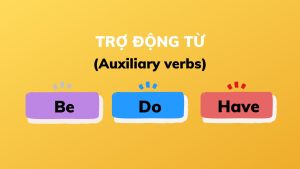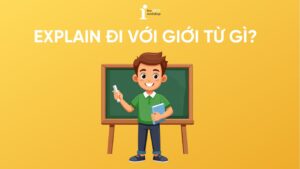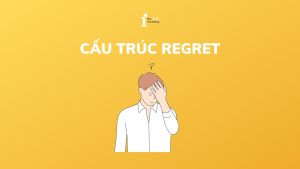Câu điều kiện là một trong những mục ngữ pháp nâng cao thường xuất hiện trong đời sống lẫn trong các bài thi. Để làm tốt dạng bài này, các bạn cần nắm vững cấu trúc và các dạng bài tập viết lại câu điều kiện phổ biến. Cùng The IELTS Workshop tìm hiểu rõ hơn qua bài viết dưới đây nhé.
1. Tổng ôn kiến thức về câu điều kiện
Câu điều kiện được sử dụng nhằm diễn đạt một giả định về một sự việc chỉ có thể xảy ra khi điều kiện được đề cập được đáp ứng, gồm hai mệnh đề: mệnh đề điều kiện (hay còn gọi là mệnh đề if) và mệnh đề kết quả (mệnh đề chính). Để sử dụng thành thạo cấu trúc câu điều kiện, người học cần thực hành thường xuyên thông qua các bài tập viết lại câu.
1.1 Câu điều kiện loại 0
Câu điều kiện loại 0 được sử dụng để diễn tả những sự thật hiển nhiên hoặc các quy luật tự nhiên xảy ra khi có một điều kiện nhất định.
| Động từ thường | Động từ tobe | |
| Công thức | If + S + V (hiện tại đơn), S + V (hiện tại đơn) | If + S + am/is/are + N/Adj, S + am/is/are + N/Adj |
| Đảo ngữ | Should + S + V-inf, S + V (hiện tại đơn) | Were + S + N/Adj, S + V (hiện tại đơn) |
Ví dụ:
- If water reaches 100°C, it boils. (Nếu nước đạt 100°C, nó sẽ sôi.)
- Should you mix blue and yellow, it creates green. (Nếu bạn trộn màu xanh dương và vàng, nó sẽ tạo ra màu xanh lá.)
1.2 Câu điều kiện loại 1
Câu điều kiện loại 1 được sử dụng để diễn tả một hành động hoặc sự kiện có khả năng xảy ra trong hiện tại hoặc tương lai, với điều kiện nhất định. Loại câu này thường dùng khi đề cập đến các tình huống thực tế hoặc có khả năng xảy ra, nhấn mạnh mối liên kết chặt chẽ giữa điều kiện và kết quả.
| Động từ thường | Động từ tobe | |
| Công thức | If + S1 + V (hiện tại đơn), S2 + should/can/will… + V-inf | If + S1 + am/is/are (not) + N/Adj, S2 + should/can/will… + V-inf |
| Đảo ngữ | Should + S1 + (not)+ V (hiện tại), S2 + should/can/will… +V-inf | Should + S1 + (not) + be + N/Adj , S2 + should/can/will… + V-inf |
Ví dụ:
- If he works harder, he will achieve his goals. (Nếu anh ấy làm việc chăm chỉ hơn, anh ấy sẽ đạt được mục tiêu.)
- If the weather is nice tomorrow, we will have a picnic. (Nếu thời tiết đẹp vào ngày mai, chúng ta sẽ đi dã ngoại.)
1.3 Câu điều kiện loại 2
Câu điều kiện loại 2 được sử dụng để diễn đạt những tình huống không có khả năng xảy ra trong thực tế hiện tại. Tình huống đó chỉ là giả thuyết, không thể xảy ra.
Trong mệnh đề điều kiện loại 2, động từ to be luôn là “were”, bất kể chủ ngữ là số ít hay số nhiều.
| Động từ thường | Động từ tobe | |
| Công thức | If + S1 + V2/ed, S2 + would/might/could… + V-inf | If + S1 + were (not), S2 + would/might/could… + V-inf |
| Đảo ngữ | Were + S1 + (not) + to V, S2 + would/might/could… + V-inf | Were + S1 + (not) + N/Adj, S2 + would/might/could … + V-inf |
Ví dụ:
- If I were you, I would apologize. (Nếu tôi là bạn, tôi sẽ xin lỗi.)
- Were I to know the answer, I would tell you. (Nếu tôi biết câu trả lời, tôi sẽ nói cho bạn biết.)
1.4 Câu điều kiện loại 3
Câu điều kiện loại 3 được sử dụng để mô tả những tình huống không có thật trong quá khứ, đồng thời đưa ra một giả thiết đối lập với thực tế đã xảy ra.
| Động từ thường | Động từ tobe | |
| Công thức | If + S1 + had + V3/ed, S2 + would/might/could… + have + V3/ed | If + S1 + had (not) been + N/Adj, S2 + would/might/could … + have + V3/ed |
| Đảo ngữ | Had + S1 + (not) +V3/ed, S2 + would/might/could… + have + V3/ed | Had + S1 + (not) + been + N/Adj , S2 + would/might/could… + have + V3/ed |
Ví dụ:
- If it had been sunny yesterday, we would have gone to the beach. (Nếu hôm qua trời nắng, chúng tôi đã đi biển.)
- Had she studied harder, she would have passed the exam. (Nếu cô ấy học chăm chỉ hơn, cô ấy đã vượt qua kỳ thi.)
1.5 Câu điều kiện hỗn hợp
Câu điều kiện hỗn hợp được sử dụng để diễn tả những tình huống trái ngược với thực tế trong quá khứ và giả định về kết quả nếu những tình huống đó thực sự xảy ra.
| Công thức | If + S1 + had + V3/ed, S2 + would/might/could… + V-inf |
| Đảo ngữ | Had + S1 + (not) + V3/ed + O, S2 + would/might/could + V-inf |
Ví dụ:
- If she had been more careful, she would be in a better situation now. (Nếu cô ấy đã cẩn thận hơn, hiện tại cô ấy sẽ ở trong tình huống tốt hơn.)
- Had he studied harder, he would be successful now. (Nếu anh ấy đã học chăm chỉ hơn, hiện tại anh ấy sẽ thành công.)
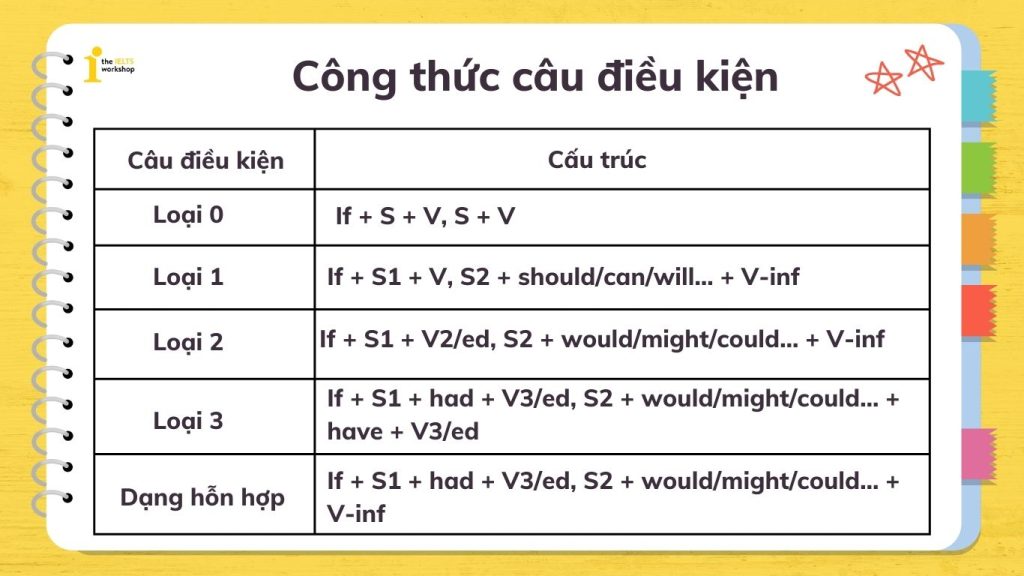
Xem thêm: Tổng hợp Ngữ pháp tiếng Anh trọng tâm trong kỳ thi THPT Quốc gia
2. Các dạng viết lại câu điều kiện
2.1 Dạng bài dùng If để viết lại câu
Với dạng bài này, đề sẽ cung cấp hai vế câu, thường nối bằng các liên từ như “that’s why”, “because”, “so”.
Cách làm bài như sau:
1. Cả hai vế câu đều ở thì tương lai đơn: Viết lại câu dùng If loại 1 (không phủ định).
Ví dụ:
- I will finish my work. I will go out with friends. => If I finish my work, I will go out with friends. (Nếu tôi hoàn thành công việc, tôi sẽ đi ra ngoài với bạn bè.)
- He will call you. He will explain the situation. => If he calls you, he will explain the situation. (Nếu anh ấy gọi bạn, anh ấy sẽ giải thích tình huống.)
2. Câu đề bài có thì quá khứ đơn: Viết lại câu dùng If loại 3 (phủ định).
Ví dụ:
- They didn’t tell me the news. I was surprised. => If they had told me the news, I wouldn’t have been surprised. (Nếu họ đã nói cho tôi nghe tin tức, tôi đã không ngạc nhiên như vậy.)
- You didn’t finish the project on time. Your boss was disappointed. => If you had finished the project on time, your boss wouldn’t have been disappointed. (Nếu bạn đã hoàn thành dự án đúng hạn, sếp của bạn đã không thất vọng.)
3. Một vế thì hiện tại, vế còn lại ở thì tương lai hoặc hiện tại: Viết lại câu dùng If loại 2 (phủ định mệnh đề trong câu).
Ví dụ:
- She doesn’t study hard. She fails the exam. => If she studied hard, she wouldn’t fail the exam. (Nếu cô ấy học chăm chỉ, cô ấy sẽ không bị trượt kỳ thi.)
- He doesn’t save money. He won’t afford a car. => If he saved money, he could afford a car. (Nếu anh ấy tiết kiệm tiền, anh ấy có thể mua được một chiếc ô tô.)
4. Thay “if” cho “because,” nếu câu đề bài ở dạng khẳng định => Khi viết lại, bạn chuyển thành phủ định và ngược lại.
Ví dụ:
- I can’t go to the park because it’s raining. => If it weren’t raining, I could go to the park. (Nếu trời không mưa, tôi có thể đi đến công viên.)
- She can’t attend the meeting because she’s sick. => If she weren’t sick, she could attend the meeting. (Nếu cô ấy không ốm, cô ấy có thể tham gia cuộc họp.)
5. Với “so,” “that’s why” trong câu đề bài, khi viết lại, “if” sẽ ở mệnh đề ngược lại.
Ví dụ:
- John forgot his homework. That’s why he got punished. => If John hadn’t forgotten his homework, he wouldn’t have been punished. (Nếu John không quên bài tập về nhà, anh ấy đã không bị phạt.)
- The team practiced every day. That’s why they won the championship. => If the team hadn’t practiced every day, they wouldn’t have won the championship. (Nếu đội không luyện tập mỗi ngày, họ đã không giành chiến thắng trong giải vô địch.)
Xem thêm: Tổng hợp kiến thức ngữ pháp: 12 thì trong tiếng Anh
2.2 Viết lại câu có cấu trúc “without” thành dạng “if”
Đối với dạng bài có cấu trúc “without”, bạn có thể đổi câu sang dạng if not mà nghĩa vẫn giữ nguyên.
Ví dụ:
- Without his assistance, we couldn’t complete the project. => If he hadn’t assisted us, we couldn’t have completed the project. (Nếu anh ấy không giúp đỡ, chúng tôi đã không thể hoàn thành dự án.)
- Without your advice, I wouldn’t have made that decision. => If you hadn’t given me advice, I wouldn’t have made that decision. (Nếu bạn không tư vấn, tôi đã không đưa ra quyết định đó.)
2.3 Viết lại câu có cấu trúc “if” thành cấu trúc “unless”
Cấu trúc Unless sẽ tương đương với If… not
Vậy nên, với dạng bài này, bạn thay “unless” vào chỗ “If”, bỏ “not”, vế còn lại vẫn giữ nguyên.
Ví dụ:
- If you don’t leave now, you’ll miss the bus. => Unless you leave now, you’ll miss the bus. (Trừ khi bạn rời đi ngay bây giờ, bạn sẽ lỡ chuyến xe buýt.)
- If she doesn’t study harder, she won’t pass the exam. => Unless she studies harder, she won’t pass the exam. (Trừ khi cô ấy học chăm chỉ hơn, cô ấy sẽ không qua kỳ thi.)
2.4 Viết lại câu có từ “or,” “otherwise” thành dạng “if”
Với dạng câu có or, otherwise: Câu mệnh lệnh + or/otherwise + S + will…, bạn có thể viết lại bằng cụm “If you don’t…” (lược bỏ or hoặc otherwise).
Ví dụ:
- Be quiet, otherwise you will disturb the class. => If you don’t be quiet, you will disturb the class. (Nếu bạn không im lặng, bạn sẽ làm phiền lớp học.)
- Hurry up, or you will miss the last train. => If you don’t hurry up, you will miss the last train. (Nếu bạn không nhanh lên, bạn sẽ lỡ chuyến tàu cuối cùng.)
2.5 Viết lại câu có cấu trúc “But for” thành cấu trúc “If”
Với câu có cấu trúc But for: But for + N/V-ing, S + V…, bạn có thể thay “But for” bằng “If it weren’t for” và giữ nguyên phần còn lại.
Ví dụ:
- But for her quick thinking, we would have been late. => If it weren’t for her quick thinking, we would have been late. (Nếu không nhờ sự suy nghĩ nhanh chóng của cô ấy, chúng tôi đã bị muộn.)
- But for the rain, we would have gone to the beach. => If it weren’t for the rain, we would have gone to the beach. (Nếu không phải vì mưa, chúng tôi đã đi ra biển.)
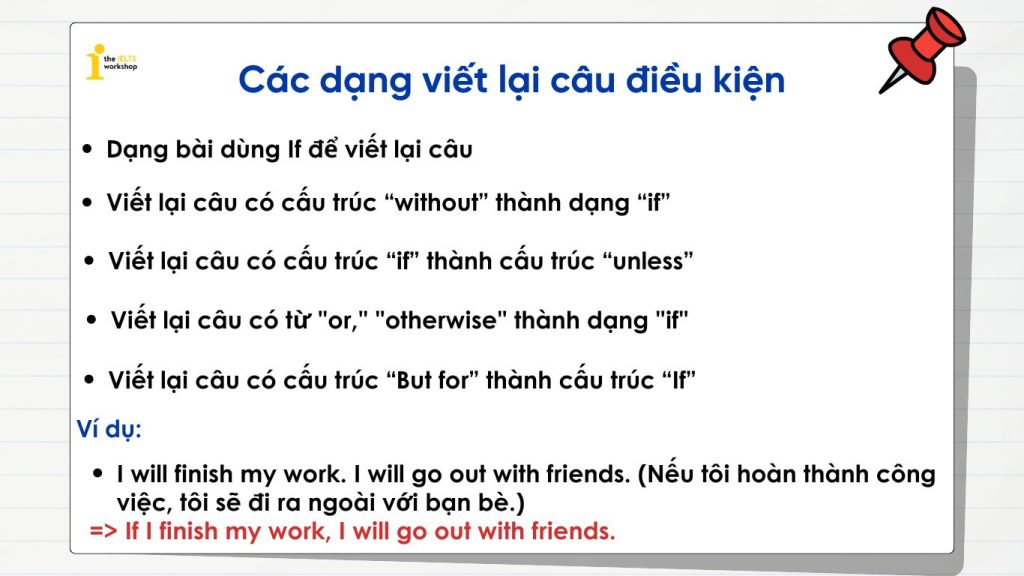
Xem thêm: Passive Voice (Câu bị động): Những kiến thức cần nắm vững
Bài tập viết lại câu điều kiện có đáp án
Bài 1: Viết lại các câu sau thành câu điều kiện:
- Tom always forgets his keys. That’s why he has to knock on the door to get in.
=> If Tom………………………………………………………………………………………………………….
- She will pass the exam. She studies every day.
=> If she…………………………………………………………….
- If you study harder, you will get better grades.
=> You will get better grades if…………………………..
- If I had known you were coming, I would have prepared something for you.
=> I would have prepared something for you if……………………………………………….
- Peter missed the bus because he woke up late this morning.
=> If Peter……………………………………………………………………………….
- If they don’t leave now, they will miss the beginning of the movie.
=> They will miss the beginning of the movie if………………………………..
- If I were you, I would talk to my boss about the issue.
=> You should talk to your boss about the issue if………….
- If she hadn’t forgotten her umbrella, she wouldn’t have gotten wet.
=> She wouldn’t have gotten wet if……………………………………………………
- If the weather is good tomorrow, we’ll go to the beach.
=> We’ll go to the beach if……………………………………………….
- If I didn’t lose my phone, I could contact my friends now.
=> I could contact my friends now if……………………………………
Bài 2: Viết lại các câu If sau thành dạng đảo ngữ:
- If you heat water to 100 degrees Celsius, it boils.
- If I had enough money, I would buy a house.
- If she had gone to the party, she would have met him.
- If they offer you the job, will you accept it?
- If I had studied harder, I would have passed the test.
- If I were in your shoes, I wouldn’t hesitate.
- If we don’t leave now, we’ll be late for the movie.
- If he hadn’t told the truth, she would have been angry.
- If you don’t water the plants, they die.
- If they had known about the meeting, they would have attended.
Bài 3: Điền vào chỗ trống dạng đúng của từ:
- If it rains tomorrow, we will stay home.
=> ___________ tomorrow, we ___________ home. - If I had known about the event, I would have attended.
=> ___________ about the event, I ___________ attended. - They will not succeed in the competition because they don’t practice hard enough.
=> ___________ harder, they ___________ succeed in the competition. - The children are not playing outside because it is cold.
=> ___________ cold, the children ___________ play outside. - I can’t hear you clearly because the music is loud.
=> ___________ loud, I ___________ hear you clearly. - He will buy a new car if he saves enough money.
=> ___________ enough money, he ___________ a new car. - They didn’t invite me to the party, so I didn’t go.
=> ___________ me to the party, I ___________ gone. - If she took the bus, she would arrive earlier.
=> She ___________ the bus, she ___________ arrive earlier. - If we had left earlier, we wouldn’t have missed the flight.
=> We ___________ earlier, we ___________ missed the flight. - He won’t get the job because he doesn’t meet the requirements.
=> ___________ the requirements, he ___________ get the job.
Bài 4: Dùng những cấu trúc đã học để viết lại các câu sau:
- If she wakes up early, she will go for a jog.
Đảo ngữ: _____________________________
Sử dụng otherwise: _____________________________ - If we had known about the traffic jam, we would have left earlier.
Sử dụng but for: _____________________________
Sử dụng unless: _____________________________ - If they don’t hurry, they will miss the train.
Đảo ngữ: _____________________________
Sử dụng otherwise: _____________________________ - If you had studied harder, you would have passed the exam.
Sử dụng without: _____________________________
Đảo ngữ: _____________________________ - If I have time tomorrow, I will help you with your project.
Sử dụng unless: _____________________________
Sử dụng otherwise: _____________________________ - If you were more careful, you wouldn’t have broken the vase.
Đảo ngữ: _____________________________
Sử dụng unless: _____________________________ - If she had told me the truth, I wouldn’t have been angry.
Sử dụng without: _____________________________
Đảo ngữ: _____________________________ - If they study every day, they improve their skills.
Sử dụng unless: _____________________________
Sử dụng otherwise: _____________________________ - If he had been on time, we would have caught the flight together.
Sử dụng but for: _____________________________
Đảo ngữ: _____________________________ - If we visit them next week, we will have a great time.
Sử dụng unless: _____________________________
Sử dụng otherwise: _____________________________
Bài 5: Dựa theo gợi ý, hãy viết lại các câu sau:
- She drinks a lot of water, so she stays healthy.
=> If she drinks a lot of water, ______________________. - He doesn’t have a job right now, that’s why he is unhappy.
=> ______________________, he would be happy. - They couldn’t attend the meeting because they were busy.
=> If they hadn’t been busy, _______________________. - If you study hard, you will pass the test.
=> _______________________, you will pass the test. - She forgot to bring her umbrella, so she got wet.
=> If she had remembered to bring her umbrella, _______________________. - I don’t eat breakfast, that’s why I feel tired in the morning.
=> If I ate breakfast, ___________________________. - If he had known about the party, he would have gone.
=> But for __________________________, he would have gone to the party. - If you eat too much, you will feel sick.
=> _______________________ otherwise you will feel sick. - They didn’t invite me to the party, that’s why I didn’t go.
=> If they had invited me to the party, _________________________. - If she speaks French, she can work in Paris.
=> _____________________, she can work in Paris.
Bài 6: Viết lại các câu điều kiện sau thành câu có “or” hoặc “otherwise”:
- If it rains tomorrow, we will stay at home. (otherwise)
- If you study harder, you will pass the exam. (or)
- If you had told me earlier, I would have helped you. (otherwise)
- If you don’t water the plants, they will die. (or)
- If I knew about the party, I would have attended. (otherwise)
- If she had followed my advice, she wouldn’t have made that mistake. (or)
- If they are late again, they will miss the bus. (otherwise)
- If you take the wrong route, you will get lost. (or)
- If I have time tomorrow, I will call you. (otherwise)
- If you didn’t eat so much junk food, you would feel better. (or)
Đáp án:
Bài 1:
- If Tom didn’t forget his keys, he wouldn’t have to knock on the door to get in.
- If she studies every day, she will pass the exam.
- You will get better grades if you study harder.
- I would have prepared something for you if I had known you were coming.
- If Peter had woken up earlier this morning, he wouldn’t have missed the bus.
- They will miss the beginning of the movie if they don’t leave now.
- You should talk to your boss about the issue if you were me.
- She wouldn’t have gotten wet if she had brought her umbrella.
- If I knew her phone number, I would call her.
- If they had left earlier, they would have caught the train.
Bài 2:
- Should you heat water to 100 degrees Celsius, it boils.
- Were I to have enough money, I would buy a house.
- Had she gone to the party, she would have met him.
- Should they offer you the job, will you accept it?
- Had I studied harder, I would have passed the test.
- Were I in your shoes, I wouldn’t hesitate.
- Should we not leave now, we’ll be late for the movie.
- Had he not told the truth, she would have been angry.
- Should you not water the plants, they die.
- Had they known about the meeting, they would have attended.
Bài 3:
- rains, will stay
- had known, would have attended
- practiced, would succeed
- weren’t, would play
- weren’t, could
- saves, will buy
- had invited, would have gone
- took, would
- had left, wouldn’t have
- met, would
Bài 4:
- Should she wake up early, she will go for a jog./ She should wake up early, otherwise she won’t go for a jog.
- But for the traffic jam, we would have left earlier./ Unless we had known about the traffic jam, we would have left earlier.
- Unless they hurry, they will miss the train./ They should hurry, otherwise they will miss the train.
- Without studying harder, you wouldn’t have passed the exam./ Had you studied harder, you would have passed the exam.
- Unless I have time tomorrow, I won’t help you with your project./ I will help you with your project, otherwise, I will be too busy.
- Were you more careful, you wouldn’t have broken the vase./ Unless you were more careful, you would have broken the vase.
- Without telling me the truth, I wouldn’t have been angry./ Had she told me the truth, I wouldn’t have been angry.
- Unless they study every day, they won’t improve their skills./ They need to study every day, otherwise they won’t improve their skills.
- But for him being late, we would have caught the flight together./ Had he been on time, we would have caught the flight together.
- Unless we visit them next week, we won’t have a great time./ We will have a great time, otherwise, we won’t visit them next week.
Bài 5:
- If she drinks a lot of water, she stays healthy.
- If he had a job, he would be happy.
- If they hadn’t been busy, they would have attended the meeting.
- If you study hard, you will pass the test.
- If she had remembered to bring her umbrella, she wouldn’t have gotten wet.
- If I ate breakfast, I wouldn’t feel tired in the morning.
- But for knowing about the party, he would have gone.
- Eat in moderation otherwise you will feel sick.
- If they had invited me to the party, I would have gone.
- If she speaks French, she can work in Paris.
Bài 6:
- It will rain tomorrow, otherwise we will stay at home.
- Study harder or you will fail the exam.
- You should have told me earlier, otherwise I would have helped you.
- Water the plants or they will die.
- If I had known about the party, I would have attended, otherwise I wouldn’t have.
- She should have followed my advice, or she wouldn’t have made that mistake.
- They need to be on time, otherwise they will miss the bus.
- Take the wrong route or you will get lost.
- If I have time tomorrow, I will call you, otherwise I won’t.
- Don’t eat so much junk food or you will feel unwell.
Xem thêm: Mệnh đề quan hệ (Relative Clause): Các loại mệnh đề, cách dùng và bài tập
Tạm kết
Bài viết trên đã cung cấp thêm cho bạn những kiến thức quan trọng khi làm bài tập viết lại câu điều kiện. Một trong những kiến thức ngữ pháp cực kỳ cần thiết cho bất kỳ người học tiếng Anh nào. Hãy thường xuyên ôn tập và giải đề tiếng Anh để củng cố lại kiến thức của bản thân nhé!
Để biết thêm về cách học tiếng anh hiệu quả, các bạn có thể tham khảo thêm các khóa học tối ưu của The IELTS Workshop tại đây nhé! Tham khảo khóa học Freshman để nắm rõ kiến thức ngữ pháp về câu điều kiện cũng như các 20 chủ đề ngữ pháp cần biết trong IELTS nói riêng và tiếng Anh nói chung.



